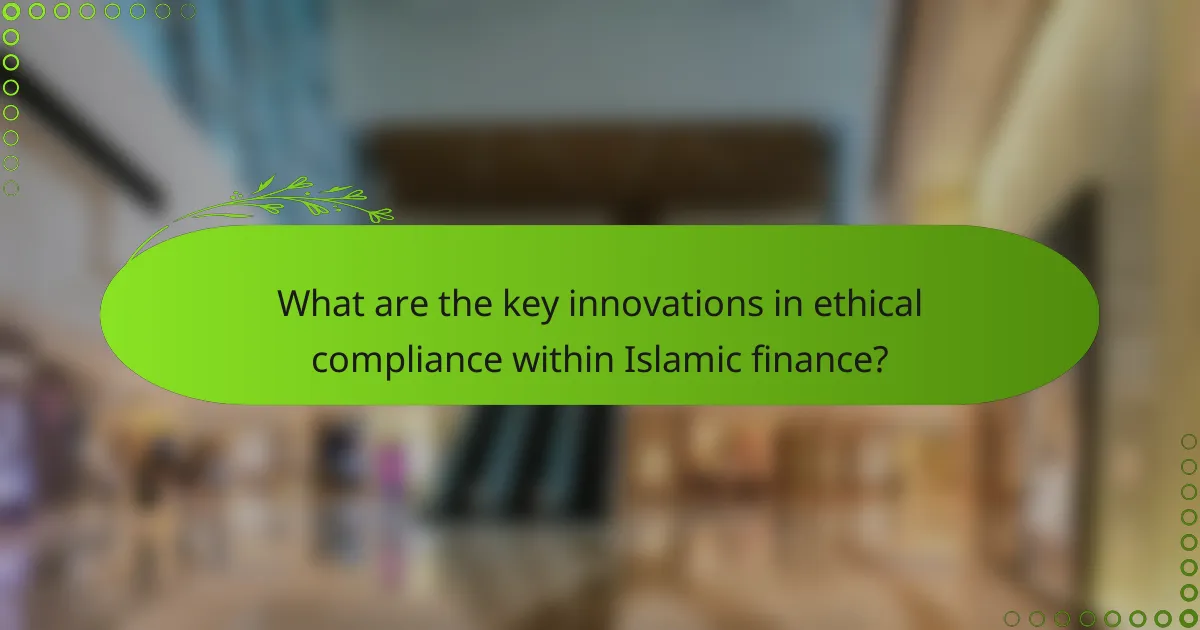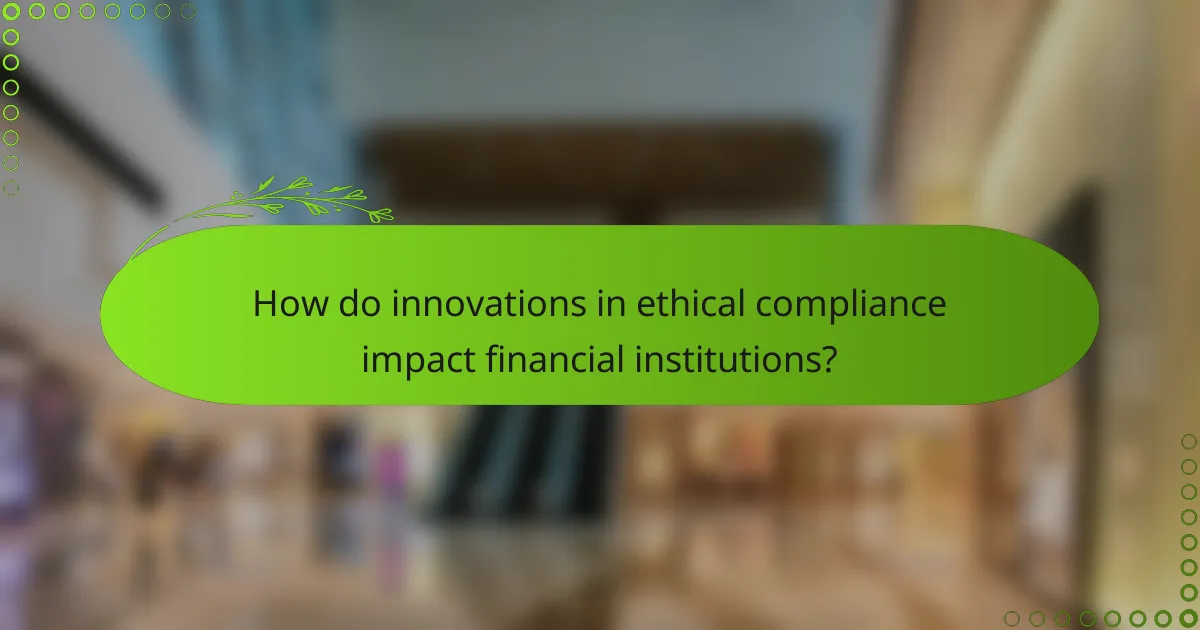
What are the key innovations in ethical compliance within Islamic finance?
Key innovations in ethical compliance within Islamic finance include the use of blockchain technology, artificial intelligence, and enhanced regulatory frameworks. Blockchain technology promotes transparency and traceability in transactions. This ensures that financial dealings adhere to Sharia principles. Artificial intelligence facilitates real-time monitoring of compliance with ethical standards. It helps in identifying non-compliant transactions quickly. Enhanced regulatory frameworks provide clearer guidelines for financial institutions. These frameworks ensure that Islamic finance operations align with ethical mandates. Collectively, these innovations strengthen the integrity of Islamic finance. They also build trust among stakeholders in the financial ecosystem.
How is technology shaping ethical compliance in Islamic finance?
Technology is shaping ethical compliance in Islamic finance by enhancing transparency and efficiency. Digital platforms enable real-time monitoring of transactions. This ensures adherence to Sharia principles. Blockchain technology provides immutable records, reducing the risk of fraud. Automated compliance tools streamline reporting processes. They minimize human error and increase accuracy. Artificial intelligence analyzes data for risk assessment. This helps institutions uphold ethical standards. Overall, technology fosters trust and accountability in Islamic finance.
What specific technologies are being utilized in this sector?
Islamic finance utilizes several specific technologies to enhance ethical compliance. Blockchain technology is used for secure and transparent transactions. Smart contracts automate compliance with Sharia law. Artificial intelligence analyzes data for risk management and decision-making. Fintech platforms provide accessible financial services aligned with Islamic principles. These technologies improve efficiency and trust in the sector. According to the World Bank, blockchain can reduce transaction costs by up to 90%.
How do these technologies enhance compliance with Islamic principles?
Technologies enhance compliance with Islamic principles by automating processes and ensuring transparency. Automation reduces human error, which is crucial in adhering to Sharia law. Blockchain technology provides a secure and immutable ledger, promoting trust in transactions. Smart contracts execute agreements automatically, ensuring that all conditions comply with Islamic finance rules. Data analytics tools can monitor transactions for compliance in real-time. These technologies also facilitate better record-keeping, which is essential for audits and accountability. Overall, technology streamlines operations while aligning with ethical standards in Islamic finance.
What trends are emerging in the landscape of Islamic finance?
Emerging trends in Islamic finance include the integration of technology and sustainable finance practices. Fintech solutions are enhancing accessibility and efficiency in Islamic banking. Digital platforms are enabling better compliance with Shariah principles. There is a growing focus on environmentally sustainable investments. Green sukuk, or Islamic bonds, are gaining popularity for funding eco-friendly projects. Additionally, there is an increase in collaborative initiatives among Islamic financial institutions. These trends reflect a shift towards innovation while adhering to ethical standards. The global Islamic finance market is projected to reach $3.69 trillion by 2024, indicating significant growth and interest in these trends.
How are regulatory changes influencing these trends?
Regulatory changes are significantly influencing trends in Islamic finance. New regulations promote transparency and ethical practices. They encourage the adoption of technology solutions for compliance. Enhanced regulations also drive financial institutions to innovate their service offerings. For instance, the implementation of stricter anti-money laundering laws has led to increased investment in compliance technologies. These technologies streamline processes and reduce operational risks. Furthermore, evolving regulations often shape consumer expectations for ethical finance. As a result, institutions must adapt to maintain competitiveness in the market.
What role do consumer expectations play in shaping these trends?
Consumer expectations significantly influence trends in Islamic finance. These expectations drive demand for ethical and Sharia-compliant financial products. As consumers become more aware of ethical considerations, they seek transparency and fairness in financial dealings. This shift prompts financial institutions to innovate and align their offerings with consumer values. For instance, a 2021 report by the Islamic Financial Services Board noted an increase in demand for sustainable investment options. This trend reflects a growing consumer preference for socially responsible investing. Consequently, financial institutions are adapting their strategies to meet these evolving expectations.

How do innovations in ethical compliance impact financial institutions?
Innovations in ethical compliance significantly enhance the operational integrity of financial institutions. These innovations streamline compliance processes through advanced technologies like artificial intelligence and blockchain. Financial institutions can automate monitoring and reporting, reducing human error and increasing efficiency. Enhanced data analytics allows for better risk management and fraud detection. Furthermore, adopting ethical compliance innovations fosters trust among clients and stakeholders. Studies show that institutions prioritizing ethical compliance experience lower regulatory fines and enhanced reputational capital. For instance, a 2021 report by Deloitte indicated that firms with robust compliance frameworks outperform peers by 20% in stakeholder trust metrics.
What benefits do these innovations provide to Islamic financial institutions?
Innovations in technology provide numerous benefits to Islamic financial institutions. These advancements enhance operational efficiency through automation of processes. Automation reduces manual errors and speeds up transaction times. Innovations also improve compliance with Shariah laws by offering better monitoring tools. Enhanced analytics allow for more informed decision-making. Furthermore, these technologies facilitate customer engagement through improved digital platforms. They enable personalized services that cater to client preferences. Overall, these innovations help Islamic financial institutions remain competitive in a rapidly evolving market.
How do they improve operational efficiency?
Innovations in ethical compliance improve operational efficiency by streamlining processes and enhancing transparency. Technology such as blockchain can automate transaction verification, reducing manual errors. Artificial intelligence can analyze compliance data in real-time, identifying risks faster. This leads to quicker decision-making and improved resource allocation. Digital platforms facilitate better communication among stakeholders, minimizing delays. According to a report by Deloitte, firms using advanced compliance technologies saw a 30% reduction in operational costs. These innovations ultimately create a more agile and responsive financial environment.
What are the implications for risk management?
The implications for risk management in Islamic finance involve heightened scrutiny and compliance with ethical standards. Islamic finance prohibits interest and promotes risk-sharing, which impacts financial product design. Institutions must assess risks related to Sharia compliance, operational processes, and market fluctuations. Effective risk management strategies must align with ethical guidelines to mitigate potential financial losses. Regulatory frameworks in Islamic finance require transparency and accountability, influencing risk assessment methodologies. This necessitates continuous monitoring and adaptation to evolving technologies and market conditions. Furthermore, the integration of fintech solutions can enhance risk management practices by providing real-time data analytics and improved compliance checks.
What challenges do institutions face when implementing these innovations?
Institutions face several challenges when implementing innovations in ethical compliance within Islamic finance. One significant challenge is the alignment of new technologies with Sharia principles. This requires thorough understanding and interpretation of Islamic law. Another challenge is the need for substantial investment in technology and training. Institutions may struggle with budget constraints and resource allocation. Additionally, there is often resistance to change from staff and stakeholders. This can hinder the adoption of new systems and processes. Compliance with regulatory requirements adds another layer of complexity. Institutions must navigate a landscape of evolving laws and standards. Finally, ensuring data security and privacy is critical. Institutions must protect sensitive information while implementing innovative solutions.
How can institutions overcome resistance to change?
Institutions can overcome resistance to change by fostering a culture of open communication. Engaging employees in discussions about changes builds trust and reduces fear. Providing clear information about the reasons for change helps employees understand its necessity. Training programs can equip staff with the skills needed to adapt effectively. Leadership support is crucial; leaders should model desired behaviors and attitudes. Involving employees in the change process increases their commitment. Recognizing and rewarding adaptability encourages a positive response to change. Research shows that organizations with strong change management practices have higher success rates in implementing new initiatives.
What are the costs associated with adopting new technologies?
The costs associated with adopting new technologies include initial investment, operational expenses, and training costs. Initial investment encompasses the purchase of hardware and software. Operational expenses involve ongoing maintenance and subscription fees. Training costs are necessary for staff to effectively use the new technology. According to a study by McKinsey, organizations can see up to a 30% increase in costs during the transition phase. Additionally, unforeseen expenses may arise, such as integration challenges with existing systems. These factors collectively influence the overall financial impact of technology adoption.

What are the future prospects for ethical compliance in Islamic finance?
The future prospects for ethical compliance in Islamic finance are promising. Increasing demand for ethical investment aligns with Islamic finance principles. Technological advancements like blockchain enhance transparency and accountability. Regulatory frameworks are evolving to strengthen compliance measures. Global interest in sustainable finance supports the growth of ethical practices. Educational initiatives are raising awareness about Islamic finance ethics. Collaborative efforts among financial institutions are fostering best practices. Overall, these trends indicate a positive trajectory for ethical compliance in the sector.
How might advancements in technology further transform this sector?
Advancements in technology may further transform the Islamic finance sector by enhancing compliance and operational efficiency. Blockchain technology can provide transparent and secure transaction records. This transparency fosters trust among stakeholders. Artificial intelligence can analyze large datasets for risk assessment and compliance monitoring. Machine learning algorithms can identify patterns that indicate non-compliance. These technologies can automate processes, reducing the time and cost of transactions. Additionally, mobile applications can improve access to financial services for underserved populations. According to a report by PwC, the adoption of fintech solutions in Islamic finance could lead to a 20% increase in market growth by 2025.
What emerging technologies could play a role in future compliance efforts?
Artificial intelligence and machine learning could significantly enhance future compliance efforts. These technologies can analyze vast amounts of data quickly. They identify patterns and anomalies in financial transactions. Blockchain technology offers transparency and traceability for compliance processes. Smart contracts automate compliance checks in real-time. Natural language processing can improve the understanding of regulatory texts. Additionally, cloud computing provides scalable solutions for data storage and processing. These technologies collectively streamline compliance and reduce risks associated with regulatory violations.
How can financial institutions prepare for these changes?
Financial institutions can prepare for changes in Islamic finance by adopting advanced compliance technologies. These technologies enhance monitoring and reporting capabilities. Institutions should invest in tools that ensure adherence to Sharia principles. Training staff on ethical compliance is also crucial. Regular audits can identify gaps in compliance practices. Collaborating with Sharia scholars can provide necessary insights. Engaging in continuous market research helps institutions stay updated on emerging trends. By implementing these strategies, financial institutions can effectively navigate changes in Islamic finance.
What best practices can organizations adopt for effective ethical compliance?
Organizations can adopt several best practices for effective ethical compliance. First, they should establish a clear code of ethics. This code should outline expected behaviors and decision-making processes. Training programs are essential for educating employees about ethical standards. Regular workshops can reinforce these principles. Additionally, organizations should implement a robust reporting system for ethical concerns. This system must ensure confidentiality and protection against retaliation. Regular audits and assessments can help identify compliance gaps. Engaging leadership in ethical discussions fosters a culture of integrity. Research indicates that organizations with strong ethical compliance programs experience lower instances of misconduct. A study by the Ethics & Compliance Initiative found that 60% of employees reported feeling empowered to raise ethical concerns in compliant organizations.
How can institutions ensure ongoing adherence to Islamic principles?
Institutions can ensure ongoing adherence to Islamic principles by implementing robust compliance frameworks. These frameworks should include regular training for employees on Islamic finance principles. Institutions must establish clear policies that align with Sharia law. Regular audits should be conducted to assess compliance with these policies. Engaging Sharia boards for guidance is essential. Institutions should also utilize technology for monitoring transactions. Data analytics can help identify non-compliant activities. Transparency in reporting practices reinforces accountability and trust.
What strategies can enhance transparency and accountability?
Implementing technology-driven solutions enhances transparency and accountability. Utilizing blockchain technology allows for secure, immutable record-keeping. This promotes trust by providing a clear audit trail. Regular reporting and disclosure of financial information further support transparency. Engaging stakeholders in decision-making processes fosters accountability. Establishing clear governance frameworks ensures adherence to ethical standards. Training employees on compliance policies reinforces a culture of transparency. Third-party audits add an extra layer of scrutiny, ensuring accuracy and reliability. These strategies collectively build a robust system of accountability in Islamic finance.
The main entity of the article is ethical compliance within Islamic finance. The article explores key innovations such as blockchain technology, artificial intelligence, and enhanced regulatory frameworks that promote transparency and adherence to Sharia principles. It discusses how technology shapes compliance, the specific tools being utilized, and the implications for financial institutions. Additionally, it highlights emerging trends, the influence of regulatory changes, and consumer expectations on the sector, while addressing challenges and strategies for effective implementation. The future prospects for ethical compliance in Islamic finance are also examined, emphasizing the role of technological advancements and best practices.